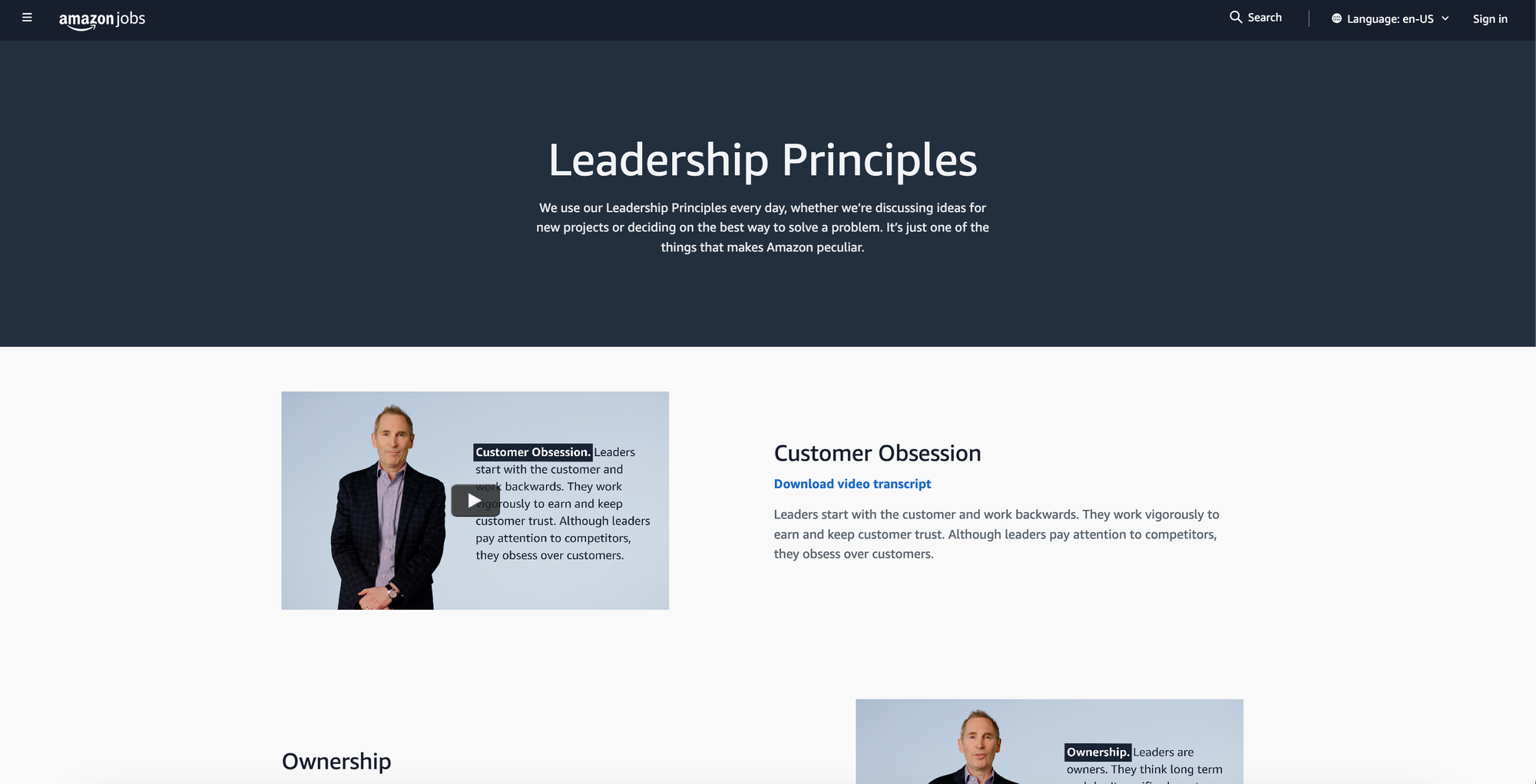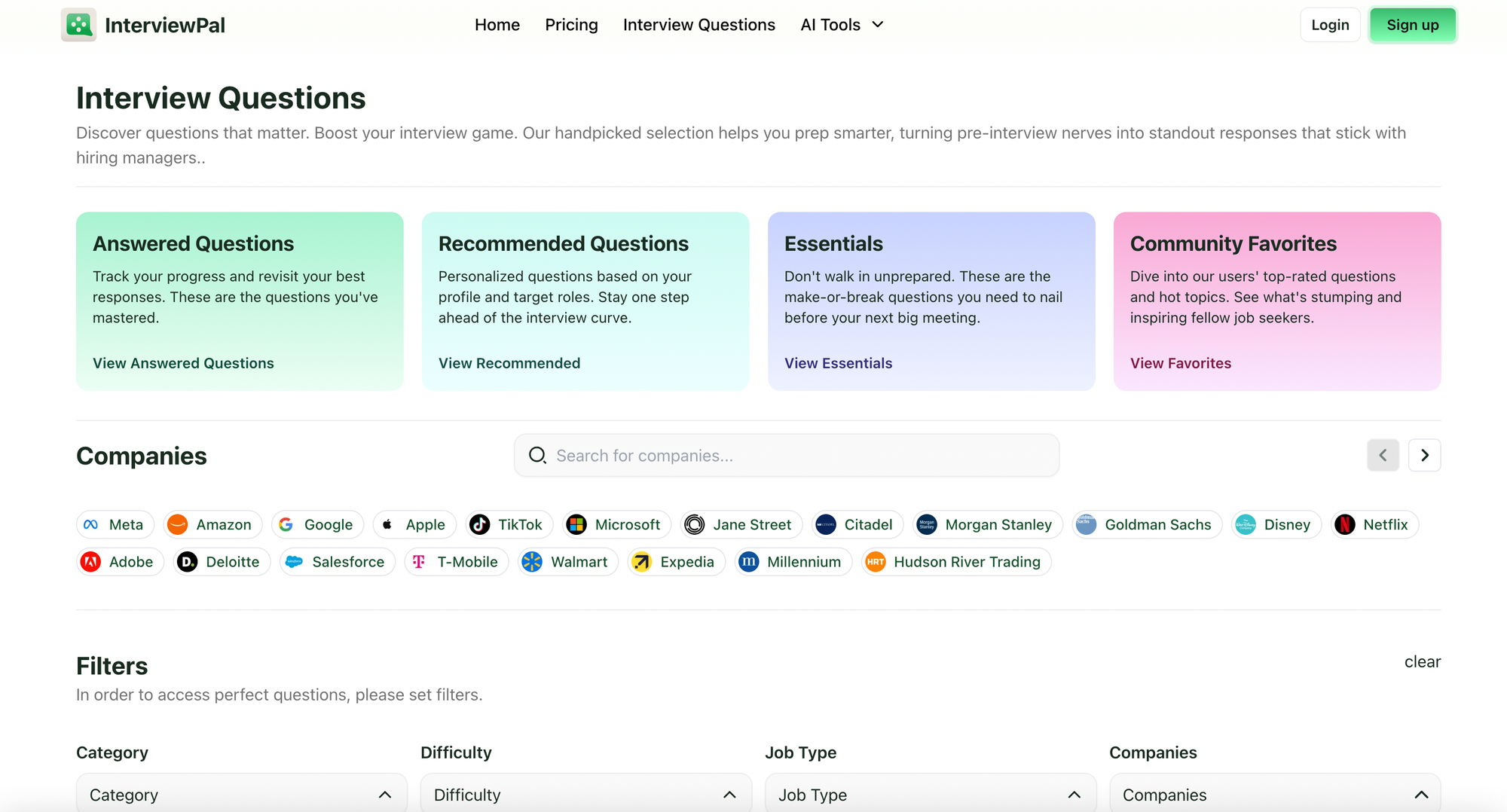Amazon Program Manager Interview Questions in 2025
Prepare for your 2025 Amazon Program Manager interview with real questions, leadership principle insights, and proven tips to stand out and succeed.

Preparing for an Amazon Program Manager interview in 2025 means understanding Amazon’s unique interview style, the types of questions asked, and the latest trends in their hiring process. Amazon remains a highly sought-after employer, and its interview process is rigorous and thorough. Both entry-level and seasoned program management candidates should be ready to face a mix of technical, behavioral, and leadership principle-based questions. In this post, we’ll highlight the most common questions in each category, explain what interviewers are looking for, and note recent developments (like virtual interview formats and new leadership principles) that candidates should keep in mind. The goal is to give you a clear, factual, and up-to-date guide to Amazon’s Program Manager interviews in 2025.
Amazon’s Interview Approach in 2025: An Overview
Amazon’s interview process is deeply rooted in its Leadership Principles – the 16 core values that guide the company’s culture and decisions. These principles aren’t just corporate jargon; Amazon evaluates every candidate “through the lens of these principles”. In practice, this means that many interview questions (especially for non-technical roles like Program Managers) are behavioral questions designed to see if you “live and breathe” Amazon’s Leadership Principles.
Interviewers are less interested in hypothetical puzzles or trick questions and more focused on how your real past experiences demonstrate qualities like ownership, customer obsession, and problem-solving. In fact, Amazon explicitly avoids brainteasers or riddles – “We won’t ask brain teasers. Instead, we’ll focus on the ‘what’ and ‘how’ of your experiences, as well as the ‘why’ of your decisions.”
This reflects Amazon’s philosophy that past behavior is the best indicator of future performance.
Interview format: In 2025, Amazon’s hiring process for Program Managers typically includes an initial phone screen (or video call), a take-home writing exercise, and then an interview “loop” with multiple interviewers. The initial screening (usually 30–45 minutes) checks your basic qualifications and motivation. Expect a mix of questions covering your background, a few behavioral questions (often aligned to key leadership principles), and perhaps some role-specific scenarios
For example, you may be asked “Why do you want to work at Amazon?” and to discuss challenges you handled in previous projects. If you pass the screening, Amazon commonly assigns a written exercise before the main interviews. This writing assessment (typically a two-page essay) is unique to program management roles; you’ll be given a prompt related to a program or product scenario and asked to articulate your approach or solution. Recruiters use this to evaluate your thought process and communication clarity, reflecting Amazon’s document-driven culture where clear writing is valued.
After the writing sample, candidates proceed to the interview loop, which in Amazon’s case consists of about 4–6 back-to-back interviews (each lasting 45–60 minutes). These interviews may still be conducted virtually via video conference (a practice widely adopted during the pandemic and continuing in 2025), though some onsite interviews have resumed in certain cases. Notably, Amazon’s process is consistent regardless of format – “Whether conducted virtually or in-person, the loop maintains its rigorous structure,” with even additional breaks scheduled in virtual sessions to help maintain focus. During the loop, you will meet a variety of interviewers: the hiring manager, peer program managers, cross-functional stakeholders, and a Bar Raiser (an objective Amazon interviewer from another team whose role is to ensure hiring standards stay high). Each interviewer will have specific areas or Leadership Principles to evaluate, and together they form a complete picture of your fit for the Program Manager role.

Importantly, for Program Manager (PM) positions (which are generally non-coding roles), the emphasis is far more on behavioral and leadership questions than on deep technical grilling. As Amazon’s own hiring guide notes, technical roles like software engineering devote about half the interviews to technical skills, whereas non-technical roles like Product and Program Management emphasize behavioral competencies much more heavily. You should expect multiple behavioral interviews focusing on your past experiences using the STAR method, and possibly one case study or role-specific exercise during the loop. Technical knowledge is still relevant – for example, understanding of program management tools, data analysis, or the domain of the team – but it’s usually assessed in the context of scenarios rather than through coding tests. In the next sections, we’ll break down the types of questions you’re likely to encounter: behavioral questions, leadership principle questions, and technical/role-specific questions.
Behavioral Interview Questions and What They Reveal
Behavioral questions are the cornerstone of Amazon’s PM interviews. These questions ask about your past experiences and how you handled various work situations. The goal is to understand your behavior, decision-making, and problem-solving in real scenarios – essentially, to see how you “earn trust,” handle conflict, take ownership, fail and learn, or deliver results in your previous roles. Interviewers using behavioral questions want concrete examples that illustrate your skills and judgment. They are listening for not just what you did, but how you did it and why.
Expect many “Tell me about a time when…” questions. In fact, an analysis of Amazon PM interview data found that roughly two-thirds of the questions are behavioral. Each interviewer typically asks two or three behavioral questions focusing on challenges or successes you’ve experienced, often mapping to the Amazon Leadership Principles. For instance, you might be asked:
“Tell me about a time when a project failed despite your team’s best efforts. What happened and what did you do?” – a question like this probes how you handle failure, resiliency, and learning from mistakes. The interviewer is looking to see if you take ownership of problems and can analyze what went wrong (rather than blaming others), and how you adapt afterward.
“Describe a time you had to collaborate with multiple teams to deliver a project.” – this explores teamwork and stakeholder management, crucial for a PM. Amazon wants evidence that you can earn trust and influence others when you don’t have direct authority.
“Tell me about a time you resolved a conflict within your team.” – a classic behavioral question checking your interpersonal skills and ability to maintain a productive team environment. It can also reflect the Leadership Principle “Earn Trust” and “Have Backbone; Disagree and Commit” if the story involves handling disagreements constructively.
Other common examples include explaining how you dealt with tight deadlines, how you handled a project that impacted your work-life balance, or how you responded to a colleague who was underperforming. Each is an opportunity to demonstrate qualities like bias for action, ownership, and empathy.
When answering behavioral questions, use the STAR method (Situation, Task, Action, Result) – Amazon highly encourages this structured format for clarity. One Amazon candidate on Glassdoor shared this advice: “I HIGHLY recommend the STAR format. Amazon is very results driven. Don't focus on non-essential information. Focus on actions and results.”
In practice, this means your answers should briefly set the context (the situation and task), then spend most of the time on what you specifically did (actions you took) and what outcome you achieved (results, with data or metrics if possible). Amazon interviewers love to hear measurable impacts – for example, how your actions “improved X by Y%” or “saved Z dollars” – because it shows a data-driven mindset and a focus on results. Being concise and factual is key; interviewers will often ask follow-ups if they need more detail, but they prefer you get to the point quickly. Don’t be surprised if the interviewer takes a very direct, no-nonsense approach – some candidates note there is often minimal small talk, and interviewers dive straight into questions. This direct style is normal at Amazon, as they have a lot to cover in a short time.
What are interviewers looking for?
With behavioral questions, Amazon interviewers are evaluating how your past behavior aligns with their values and the demands of the PM role. They want to see evidence of leadership, problem-solving, adaptability, and a track record of delivering results. For example, if you recount a project failure, they listen for signs of accountability (do you take ownership or make excuses?), learning (did you identify root causes and apply lessons forward?), and leadership (how you led or motivated the team in tough times). If you describe a cross-team project, they are gauging your ability to communicate and influence (did you get buy-in? handle differing priorities?), which is vital for a program manager who coordinates across departments. Essentially, each behavioral question is a window into how you operate on the job. Strong candidates use these questions to prove they have handled challenges similar to what they’d face at Amazon, always mapping back to qualities Amazon cares about (customer focus, bias for action, ownership, etc.). Answering in a story format (STAR) with clear actions and outcomes shows the interviewer a concrete example of you exhibiting good judgment and leadership. In 2025, as in years past, demonstrating these traits through authentic stories is the surest way to impress Amazon’s bar-raisers.
Leadership Principle-Based Questions (Amazon’s Core Values in Action)
Amazon’s famous Leadership Principles (LPs) are so central that they deserve special attention. By 2025 Amazon has 16 Leadership Principles (they added two new principles in recent years focusing on being Earth’s Best Employer and on the broad responsibility that comes with scale). Interview questions are often directly based on these principles. In fact, Amazon assigns each interviewer a set of specific leadership principles to focus on during your interview. This means many behavioral questions are implicitly LP questions – but it’s useful to understand them in terms of Amazon’s values being tested.
Some LP-themed questions will be very explicit, for example asking about a situation that maps clearly to one principle.
Here are a few common Leadership Principle questions for Program Managers:
- Customer Obsession: Amazon places the customer at the center of everything. You might be asked, “Tell me about a time you had to solve a tough customer problem or improve a customer experience.” The interviewer is checking whether you truly prioritize the customer’s needs. A variation reported by candidates is, “Tell me about a time you said no to a customer request and why,” which tests your judgment in balancing customer wishes with business realities. When answering, showing that you understood the customer’s pain point and went the extra mile to fix it (or could justify why saying “no” was ultimately in the customer’s best interest) will demonstrate Customer Obsession.
- Ownership: Leaders at Amazon “think long term” and don’t say “that’s not my job.” A question like “Give an example of a time you took ownership of a project outside your formal responsibilities” could come up. Interviewers want to see you take initiative and accountability. A strong answer might describe how you proactively fixed a problem or drove an initiative without being asked, highlighting your willingness to own outcomes.
- Bias for Action: Amazon values speed. An interviewer might ask, “Tell me about a time you had to make a quick decision with incomplete information.” They are looking for decisiveness and willingness to take calculated risks. As a PM, you should show that you can act swiftly when needed, and then course-correct if necessary, rather than being paralyzed by analysis.
- Have Backbone; Disagree and Commit: Conflict and debate happen at Amazon. You may get “Tell me about a time you disagreed with a colleague or manager on an important issue.” Here, they want to see if you can challenge respectfully and persistently when you believe you’re right, and also if you can commit to a decision once it’s made, even if you initially disagreed. A good story might involve advocating a different approach in a project meeting, backing it up with data (showing you are Right, A Lot), and later supporting whatever decision was chosen without bitterness.
- Dive Deep: This principle is about being detail-oriented and analytical. An interviewer could ask something like, “Describe a situation where you had to investigate a complex problem and dig into data to find the root cause.” A Program Manager often deals with metrics and project data, so they want to hear that you’re comfortable getting into the weeds. Detailing how you used data or auditing a process to uncover an issue will demonstrate Dive Deep.
- Deliver Results: Results are the ultimate metric. Expect something like, “Tell me about a significant achievement or project you delivered under a tight timeline or with limited resources.” The focus here is whether you can produce outcomes despite obstacles – show that you hit the target through perseverance, prioritization, and perhaps creative use of resources (linking to Frugality if relevant).
- New Principles (2021 additions): Amazon’s two newer principles may also come up. “Strive to be Earth’s Best Employer” could translate to questions about how you’ve contributed to a positive team culture, developed others, or improved workplace morale or safety in a previous job.
For example: “Describe a time you championed diversity or helped make your workplace more inclusive.” “Success and Scale Bring Broad Responsibility” might appear as a question on ethical decision-making or considering the broader impact of a program. A possible prompt: “Tell me about a time you had to consider the long-term or wider consequences of a project decision.” These questions test whether you think beyond short-term results — considering employees’ well-being or society at large — which is something Amazon has been emphasizing recently as it scales.
In any leadership principle question, interviewers are looking for alignment with Amazon’s core values. It’s not enough to theoretically know the principles; you should be ready with genuine examples of how you exemplified them. Amazon’s official guidance is that you should be prepared to discuss experiences demonstrating each principle. hat might sound daunting with 16 of them, but note that many examples can cover multiple principles. For instance, a story about launching a new process might show Invent & Simplify, Bias for Action, and Deliver Results all at once. Still, pay special attention to the principles Amazon is known to probe for PM roles. Insiders and interview coaches often highlight Customer Obsession, Ownership, Bias for Action, Dive Deep, Deliver Results, and Earn Trust as frequent areas for Program Managers (these align with the core expectations of managing complex programs and leading teams).
What are interviewers looking for in LP questions? They want to see that your working style and values match Amazon’s culture. Each leadership principle question is essentially asking: “Does this person’s behavior in this scenario reflect the way we do things at Amazon?” A strong answer will not only recount what you did, but implicitly show that you hold yourself to high standards in line with Amazon’s. For example, if the question is about Insist on the Highest Standards, your answer should demonstrate that you weren’t satisfied with merely “good enough” and that you improved a process or product quality. If the principle is Earn Trust, your story might show how you were honest about a mistake and fixed it, or how you gained credibility with a difficult stakeholder through consistency and transparency. Essentially, interviewers are gauging culture fit: Can they trust you to uphold Amazon’s principles day-to-day? Do you have a customer-centric, ownership-minded, and analytical approach to your work? Hiring managers in 2025 remain laser-focused on cultural alignment, because they know that skills can often be taught, but attitude and values are harder to change. Show that you not only know the principles, but you have lived them in your career. If you can discuss your experiences in a way that naturally weaves in Amazon’s principles (without just reciting the principle names), you’ll come across as a candidate who “gets” Amazon.

Technical and Role-Specific Questions for Program Managers
While behavioral and LP questions form the bulk of the Amazon PM interview, you will also encounter technical or role-specific questions. For Program Managers, “technical” doesn’t usually mean writing code (unless you’re interviewing specifically for a Technical Program Manager role). Instead, these questions probe your program management expertise, business acumen, and problem-solving skills in scenarios relevant to the role. Think of them as questions about how you would handle certain challenges or aspects of the job.
In the initial phone screen, Amazon typically splits time between behavioral questions and functional questions related to your program/project management experience. This means you should be ready to discuss the tools, methodologies, and best practices you use as a PM. For example, you might be asked to explain your approach to project planning, risk management, or stakeholder communication. A phone interviewer could ask, “How do you prioritize and plan a project with competing deadlines?” or “What steps do you take to mitigate risks in a complex program?” These questions allow you to demonstrate your grasp of program management processes (like how you kick off projects, monitor progress, and close out a program). The interviewer is looking for structured thinking – that you have a framework for managing programs – as well as flexibility in adapting to real-world constraints.
During the on-site (or virtual loop) interviews, one of the sessions for a Program Manager is often dedicated to program management knowledge or a case study exercise. In this round, you might face hypothetical scenarios where you have to articulate what you would do. Common examples include strategy or business questions such as:
- “How would you improve Amazon’s delivery logistics to make it more efficient for customers and drivers?” – This tests your strategic thinking and understanding of Amazon’s operations. They want to see if you can break down a big problem, consider different factors (cost, speed, technology, etc.), and propose logical improvements. Even if you don’t know all the internal details, showing a structured approach and customer-focused mindset is key.
- “What factors would you evaluate before launching Amazon into a new international market?” – A question like this looks at your analytical and strategic planning skills, and whether you understand business expansion challenges. A good answer might cover market research, local customer needs, regulations, logistics, and competition, reflecting thoroughness (also touching on Dive Deep and Think Big principles).
- “How do you deal with obstacles or setbacks during a project’s execution?” – Here the interviewer assesses your problem-solving and adaptability. You should discuss a process for identifying the root cause of a problem (linking to being data-driven) and how you mobilize the team to address it, perhaps giving a real example of a hurdle you overcame.
- “Explain how you’d manage timelines in a highly matrixed environment with many dependencies.” – This is a classic PM scenario question to gauge your organizational and coordination skills. Amazon wants to hear that you can handle complexity: breaking a project into parts, setting priorities, aligning multiple teams, and keeping everything on schedule.
- “Describe a business process you had to design from scratch. What approach did you take?” – This examines your ability to create structure in ambiguity (something a PM at Amazon often faces when launching new programs). Interviewers expect you to talk about understanding requirements, involving the right stakeholders, iterating on the design, and measuring success.
Some program manager interviews can also include a discussion of metrics and data – for instance, “What metrics do you think are important for the success of X program, and how would you track them?” Demonstrating that you know how to define and measure outcomes shows you can Dive Deep and are Right, A Lot (making decisions based on data). Amazon is extremely metrics-driven, so showing comfort with numbers and analysis in your answers will score points.
If you are applying for a Technical Program Manager role or a program management role in a technical team (like AWS), expect a deeper dive into technical topics. This could involve high-level system design discussions or questions to gauge whether you can effectively work with engineers. For example, “Can you walk me through a technical architecture of a system you’ve worked with?” or a scenario where you have to balance technical trade-offs in project decisions. In any case, know the domain of the team you’re interviewing with. If it’s Amazon Web Services, for example, be prepared for questions like “Explain the AWS business model” or “How would you handle the launch of a new AWS service?” They don’t expect you to be an engineer (if you’re not in a TPM role), but they do expect you to be conversant in the technical aspects relevant to your program.
Role-specific assessments: As mentioned earlier, Amazon often includes a written case exercise for program managers, which is a significant role-specific test. In 2025 this is usually a prompt given a couple of days before your interviews, requiring a narrative document (often 2 pages) where you might have to propose a solution or analyze a scenario. For example, a prompt could be: “You are the program manager for launching a new feature on Amazon’s marketplace. Write a doc outlining how you would roll out this feature, including handling risks and measuring success.” When Amazon reviewers read this, they judge your ability to communicate clearly, think big but also dive into details, and structure your thoughts logically. Strong writing is crucial at Amazon (they famously favor written narratives over PowerPoints in meetings), so treat this assignment seriously. As one prep source notes, in the essay “recruiters [are] mainly evaluating your thought process and overall expertise in the field.
In other words, they want to see a coherent strategy: did you consider customer impact? Did you account for cross-team coordination? Are your priorities and assumptions sensible? A well-crafted written response can significantly boost your interview performance, as it showcases skills that are hard to convey in verbal answers alone (like structured thinking and attention to detail).
What interviewers are looking for in technical/role-specific questions: These questions and exercises are designed to ensure you have the professional know-how to be effective in the job. For a Program Manager, that means organizational skills, strategic thinking, understanding of project lifecycles, and the ability to work through complex scenarios pragmatically. Interviewers aren’t just looking for “the right answer” to a hypothetical; often, there may not even be a single right answer. Instead, they evaluate how you approach the problem. Do you ask smart questions or make reasonable assumptions? Do you break the problem down logically? Are you focusing on the customer and the business goals while solving it? Also, your answers here give insight into your experience level – an experienced PM might mention specific frameworks or past situations as analogies, whereas an entry-level candidate might lean more on textbook knowledge. That’s okay; just be sure to demonstrate a methodical approach and a willingness to learn. If a question touches on something you haven’t done before, it’s fine to talk about how you would tackle it, drawing on principles you know. The key is to show problem-solving ability and good judgment. For instance, if asked about handling a slipped deadline, an interviewer will gauge if you prioritize the right things (inform stakeholders early, adjust scope or resources, etc.) and if you remain calm under pressure. By preparing for a variety of “what if” scenarios and brushing up on program management fundamentals, you can confidently address these technical and role-specific questions.
To excel in an Amazon Program Manager interview in 2025, your preparation should be comprehensive:
1) Master the Leadership Principles: They truly are the DNA of the interview. For each principle, have at least one strong story (STAR format) ready. Practice saying them out loud. Get comfortable weaving principles into your answers naturally (e.g., talk about how you insisted on high standards by doing X, or how you showed customer obsession by doing Y). Amazon’s interviewers will score you on these, so take it seriously.
2) Practice Behavioral Questions extensively: Given their high frequency (well over half of the questions) rehearse a variety of scenarios from your past – successes, failures, big projects, team conflicts, innovations, etc. The more you practice, the more fluent and confident you’ll sound. Just be careful not to sound too scripted; you want to come across genuine and thoughtful. A good approach is to outline bullet points for each story rather than memorizing a script.
3) Stay Structured in Technical Questions: When tackling a scenario or technical question, outline your approach first (“First, I’d gather X data, then evaluate options A, B, C, then I’d consider stakeholder input…”). This shows the interviewer you have a method. If it helps, you can even ask for a moment to think and jot down steps, especially in a virtual interview where you can use a notepad. Interviewers appreciate a logical problem-solving process.
4) Engage with the Interviewers: Even though Amazon interviews are intense, remember that the interviewers are also looking for signals of your communication skills and leadership presence. Maintain eye contact (or camera focus), listen carefully, and answer the question that’s asked (it’s okay to ask, “Did I answer your question, or would you like more detail on any part of that?” if you’re unsure). If an interviewer offers a prompt like “what else?” or “tell me more,” they are often probing for depth or testing if you can Dive Deep. Take that as a cue to provide more specifics or a different angle of the story.
5) Leverage Credible Advice: Amazon has publicly available resources and advice from recruiters. For instance, Amazon’s own recruiters stress the importance of being specific and using the STAR method with measurable results. They also say candidates should not underestimate the initial phone screen - treat every stage with equal importance. Knowing these insights can help you avoid common pitfalls (for example, rambling too generally is a known mistake – instead, be concise and focus on your direct contributions).
With thorough preparation, familiarity with Amazon’s leadership DNA, and a calm, confident delivery, you can navigate even the toughest questions and leave a strong impression. Good luck with your Interview! And remember, every example you give is an opportunity to tell a story of leadership and impact that can set you apart in the eyes of Amazon’s hiring team.





